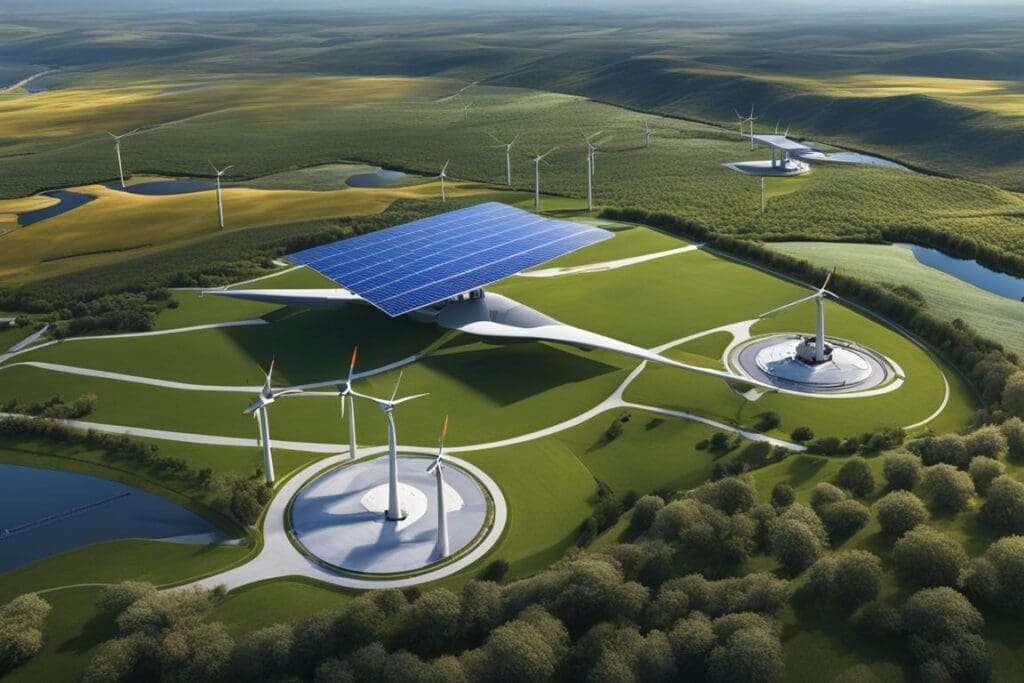Artificial intelligence (AI) and its impact on the energy industry is undeniable. With AI-powered energy solutions, we have the ability to revolutionize the way we produce, manage, and consume energy. From optimizing energy management to improving grid stability, the possibilities are endless.
AI-powered energy solutions leverage the capabilities of AI algorithms to analyze data, predict energy demand patterns, and optimize energy distribution. By harnessing the power of AI, we can unlock the potential of smart energy solutions, sustainable energy solutions, and renewable energy solutions.
Key Takeaways:
- AI-powered energy solutions have the potential to transform the energy industry.
- By leveraging AI algorithms, we can optimize energy management and improve grid stability.
- Smart energy solutions, sustainable energy solutions, and renewable energy solutions are made possible by AI.
- AI-powered energy solutions enable us to unleash the potential of advanced energy solutions and energy efficiency solutions.
- With AI, we can pave the way for a greener and more sustainable future with green energy solutions.
The Synergy of AI and Battery Storage Empowering a Sustainable Future
AI and battery storage technologies are revolutionizing the energy industry by working together to optimize energy production, consumption, and management. AI algorithms utilize data on energy demand patterns, weather conditions, and equipment performance to optimize the charging and discharging of battery storage systems. This strategic deployment of stored energy maximizes efficiency and value, ensuring optimal energy utilization. Moreover, AI-powered energy management systems analyze real-time data from connected devices to optimize energy usage, reducing peak loads and enhancing overall energy efficiency. AI also plays a crucial role in improving grid stability by analyzing complex data sets, predicting and preventing grid failures, and optimizing battery charging and discharging cycles to improve battery performance and reliability.
In the ever-growing shift towards renewable energy resources, the synergy of AI and battery storage proves to be a valuable asset. The ability of AI algorithms to predict energy demand patterns and optimize the charging and discharging of batteries ensures the efficient utilization of renewable energy resources. By leveraging the power of AI, renewable energy can be harnessed at optimal times, reducing reliance on non-renewable sources and contributing to a more sustainable future.
Advantages of AI and Battery Storage Synergy:
- Optimized energy management and utilization
- Enhanced grid stability and reliability
- Improved battery performance and longevity
- Efficient integration of renewable energy resources
“The synergy between AI and battery storage provides the capabilities needed to empower a sustainable future. By leveraging AI algorithms, we can optimize energy management, improve grid stability, and enhance battery performance. This synergy not only enables us to efficiently utilize renewable energy resources but also contributes to a more sustainable and reliable energy ecosystem.” – Energy Expert
| Advantages of AI and Battery Storage | |
|---|---|
| 1. Optimized energy management and utilization | AI algorithms predict and optimize energy demand patterns, ensuring efficient utilization of stored energy. |
| 2. Enhanced grid stability and reliability | AI analyzes data to predict and prevent grid failures, improving overall grid stability. |
| 3. Improved battery performance and longevity | AI optimizes battery charging and discharging cycles, enhancing battery performance and extending battery life. |
| 4. Efficient integration of renewable energy resources | AI ensures strategic deployment of stored energy from renewable sources, reducing reliance on non-renewable energy. |
Revolutionizing Energy Storage: The Impact of AI on Battery Technology
AI has revolutionized the field of battery technology, leading to significant advancements and improvements in energy storage. Through the utilization of sophisticated AI algorithms, battery optimization has become more efficient, resulting in enhanced energy density, longer lifespan, and improved charging capabilities. Furthermore, AI has made a profound impact on battery manufacturing, enhancing production efficiency, and reducing costs.
One of the key advantages of AI in battery technology lies in its diagnostic capabilities. AI-powered systems can analyze data in real-time, identifying potential faults and predicting maintenance needs. This enables proactive measures to be taken, reducing downtime and extending battery life. Additionally, AI plays a crucial role in grid integration, enabling seamless interaction between batteries and the energy grid. By analyzing complex data sets, AI algorithms optimize battery charging and discharging cycles, maximizing efficiency and reliability.
Undoubtedly, AI’s impact on battery technology contributes to the overall environmental sustainability of the energy sector. By optimizing energy storage and utilization, AI helps reduce reliance on non-renewable energy sources and minimizes carbon emissions. The combination of AI and battery technology paves the way for a greener future, as we strive to create a more sustainable energy ecosystem.
The Impact of AI on Battery Technology
| Key Areas of Impact | Benefits |
|---|---|
| Battery Optimization | Improved energy density, longer lifespan, enhanced charging capabilities |
| Battery Manufacturing | Increased production efficiency, reduced costs |
| Diagnostic Capabilities | Real-time fault detection, predictive maintenance, extended battery life |
| Grid Integration | Optimized charging and discharging, enhanced reliability |
| Environmental Sustainability | Reduced reliance on non-renewable energy, minimized carbon emissions |
Smart Energy Management: Harnessing the Synergies between AI and Demand Response
Energy consumption trends, energy systems optimization, and intelligent building management are key considerations in the realm of smart energy management. By harnessing the synergies between AI and demand response, energy providers can unlock a new level of efficiency and sustainability. The combination of AI algorithms and demand response mechanisms enables accurate load forecasting, optimized energy distribution, and improved grid stability.
One of the significant benefits of AI in smart energy management is its ability to analyze energy consumption trends. AI algorithms process real-time data from connected devices and extract valuable insights regarding energy usage patterns, peak loads, and inefficiencies. This data-driven approach allows for the identification of opportunities for energy optimization and informed decision-making.
In addition to optimizing energy consumption, AI also plays a crucial role in intelligent building management. By analyzing behavioral insights and real-time data, AI-powered systems can intelligently control lighting, heating, and cooling in buildings, ensuring optimal energy usage without compromising comfort. This proactive approach helps reduce electricity waste and achieve greater energy efficiency.
| Demand Response | Benefits |
|---|---|
| Load Forecasting | – Accurate predictions of peak demand – Optimal energy distribution |
| Predictive Maintenance | – Identification of potential faults – Reduced downtime |
| Financial Incentives | – Encouragement of energy consumption shift to non-peak periods – Cost savings for consumers |
| Grid Optimization | – Improved grid stability – Integration of renewable energy resources |
Collaboration between AI and demand response creates a holistic approach to smart energy management. By leveraging the power of AI algorithms and demand response mechanisms, energy providers can optimize energy distribution, reduce peak demand, and promote the integration of renewable energy resources. This synergy leads to a more sustainable energy ecosystem, ensuring a greener future for generations to come.
The Power of Efficiency: Empowering Grid Optimizations with AI and Demand Response
When it comes to grid optimization, the combination of AI and demand response is a game-changer. AI algorithms enable accurate load forecasting, ensuring that energy distribution is optimized for maximum efficiency. By analyzing data in real-time, AI can detect anomalies and potential cybersecurity threats, enhancing grid security and reliability.
One of the key benefits of AI and demand response is the ability to reduce peak demand. By incentivizing consumers to shift their energy usage to off-peak hours, demand response programs help alleviate strain on the grid during periods of high demand. This not only leads to significant financial incentives for consumers but also contributes to environmental sustainability by reducing the need for additional power generation.
The financial incentives of demand response programs go hand in hand with the environmental benefits. By reducing peak demand, energy providers can avoid costly infrastructure investments, while also reducing their carbon footprint. This creates a win-win situation for both the utility companies and the environment, fostering a more sustainable energy ecosystem.
| Benefits of AI and demand response for grid optimization | |
|---|---|
| Load forecasting | Accurate prediction of energy demand to optimize energy distribution |
| Optimized energy distribution | Efficient allocation of energy resources to minimize wastage |
| Grid security | Detection and prevention of anomalies and cybersecurity threats |
| Reduced peak demand | Incentivizing consumers to shift energy usage to off-peak hours |
| Financial incentives | Cost savings for consumers and utilities |
| Environmental benefits | Reduced reliance on fossil fuels and lower carbon emissions |
In conclusion, the combination of AI and demand response has the power to revolutionize grid optimization. By harnessing the capabilities of AI algorithms and incentivizing consumers to shift their energy usage, we can achieve efficient energy distribution, reduce peak demand, and promote a greener and more sustainable future.
The Future of Sustainability
The integration of AI and battery storage, along with the adoption of renewable energy sources and smart grid infrastructure, holds immense potential for the future of sustainability. AI-powered energy management systems optimize energy consumption, leading to increased efficiency and cost savings. The combination of AI and demand response enhances grid flexibility, allowing for seamless integration of renewable energy sources and efficient load management. AI empowers customers to actively participate in managing their energy usage, making informed decisions, and contributing to overall grid stability. The synergy between AI, battery storage, and renewable energy sources can pave the way for a sustainable future, reducing carbon emissions and minimizing reliance on traditional power sources.
With AI-powered energy management systems, the future of sustainability is within reach. By harnessing the power of artificial intelligence, energy efficiency can be optimized, leading to significant environmental benefits. AI algorithms analyze real-time data from connected devices to identify patterns and make intelligent energy-saving recommendations. This empowers customers to take control of their energy usage, contributing to a more sustainable future.
Grid flexibility is another key aspect of the future of sustainability. Through AI and demand response, the grid can adapt to the changing energy landscape. AI algorithms accurately forecast energy demand, enabling optimized energy distribution and grid stability. Demand response encourages consumers to shift energy usage to non-peak periods, reducing strain on the grid and providing financial incentives. This combination of AI and demand response ensures the efficient utilization of renewable energy sources, promoting a sustainable energy ecosystem.
Customer Empowerment through AI
AI also empowers customers to actively participate in managing their energy usage. By providing real-time data and insights, AI-powered energy management systems enable customers to make informed decisions about their energy consumption. With access to personalized energy-saving recommendations, customers can adjust their habits, optimize their energy usage, and contribute to a cleaner and more sustainable future.
| Key Benefits of AI in Sustainability |
|---|
| Optimized energy consumption |
| Enhanced grid flexibility |
| Improved customer empowerment |
| Reduction in carbon emissions |
| Minimization of reliance on traditional power sources |
The future of sustainability lies in the integration of AI into energy systems. By embracing AI-powered energy solutions, we can create a greener and more sustainable world, where efficient energy utilization, grid flexibility, and customer empowerment are at the forefront. Together, AI and renewable energy sources can pave the way towards a sustainable future.
The Impact of AI on Renewable Energy Integration
AI technology has revolutionized the integration of renewable energy sources into the grid, ushering in a new era of smart grid optimization and stability. Through advanced data analysis, predictive modeling, and renewable energy forecasting, AI algorithms have become instrumental in maximizing the efficiency and reliability of renewable energy systems.
The core strength of AI lies in its ability to process massive amounts of data from various sources, enabling the optimization of smart grids. With real-time data analysis, AI algorithms can identify patterns and trends, allowing for precise predictions of energy generation and demand. This empowers energy operators to make informed decisions about energy distribution, ensuring grid stability and reducing the risk of power outages.
Predictive modeling is another key benefit of AI in renewable energy integration. By utilizing historical data and machine learning algorithms, AI can accurately forecast renewable energy generation, helping energy providers optimize their operations and plan for future energy needs. This supports the efficient deployment of renewable energy resources and aids in achieving a sustainable and resilient energy system.
To illustrate the impact of AI on renewable energy integration, consider the following table that showcases the advancements made possible through AI-driven grid optimization and management:
| Advancements | Description |
|---|---|
| Enhanced Energy Distribution | AI algorithms optimize energy distribution, ensuring that renewable energy is efficiently delivered to consumers. |
| Improved Grid Stability | AI analyzes real-time data to detect and prevent grid failures, enhancing overall system stability and reliability. |
| Accurate Renewable Energy Forecasting | AI algorithms predict renewable energy generation, enabling accurate planning and integration into the grid. |
| Optimized Energy Management | AI-driven energy management systems optimize energy usage, reducing waste and maximizing overall efficiency. |
In conclusion, the impact of AI on renewable energy integration is undeniable. With its ability to analyze data, forecast energy generation, and optimize grid operations, AI is driving the transition to a more sustainable and efficient energy ecosystem. By embracing AI-powered solutions, we can unlock the full potential of renewable energy sources and pave the way for a greener future.
The Future of Energy Efficiency: AI and Building Management
As we strive towards a sustainable future, the role of AI in building management has become increasingly crucial. AI-powered technologies enable the creation of smart buildings that employ adaptive control systems to optimize energy expenditure and enhance overall efficiency. With AI at its core, building management systems can revolutionize energy consumption, fault detection, and predictive maintenance.
In smart buildings, adaptive control uses AI algorithms to analyze usage patterns and adjust lighting, heating, and cooling accordingly. This leads to optimal energy utilization and reduction in wastage. AI-powered fault detection systems continuously monitor various building components and quickly identify anomalies. This proactive approach allows for timely maintenance, reducing downtime and maximizing operational efficiency.
Predictive maintenance is another essential aspect of AI in building management. By analyzing the performance data of building systems, AI algorithms can predict potential faults and suggest preventive measures. This proactive approach reduces the risk of major breakdowns, increases the lifespan of equipment, and minimizes maintenance costs.
With AI revolutionizing building management, we can expect significant energy savings and a more sustainable built environment. The integration of AI technology enables us to create intelligent buildings that optimize energy usage, detect faults in real-time, and implement predictive maintenance strategies, paving the way for a greener and more efficient future.
The Role of AI in Renewable Energy Research
The integration of artificial intelligence (AI) into renewable energy research has revolutionized the development of green energy technologies. AI enables scientists and researchers to simulate and analyze complex models, accelerating the discovery and optimization of clean energy solutions. By leveraging AI-powered tools and algorithms, we can unlock new possibilities for a sustainable future powered by renewable energy sources.
Simulation and analysis are critical aspects of renewable energy research. AI allows researchers to create virtual environments and accurately simulate various scenarios, helping them understand how different factors impact energy systems and identify areas for improvement. This ability to model and analyze complex data sets enables researchers to make informed decisions and optimize the performance of green energy technologies.
One of the significant advantages of AI in renewable energy research is its ability to enhance research and development (R&D) processes. AI algorithms can analyze vast amounts of data from multiple sources, including weather patterns, energy production data, and consumption trends. By processing this information, AI systems can identify patterns, make predictions, and provide valuable insights to guide R&D efforts. This data-driven approach empowers researchers to focus their efforts on the most promising avenues of exploration, leading to more efficient and effective outcomes.
“The integration of artificial intelligence into renewable energy research has accelerated the development of clean energy solutions by enabling simulation, analysis, and data-driven insights.” – Dr. Sarah Stevens, Renewable Energy Researcher
The Future of Green Energy Technologies
The impact of AI in renewable energy research extends beyond the current state of affairs. As advancements in AI continue to emerge, it is anticipated that the synergy between AI and renewable energy will lead to even more innovative solutions. This includes the development of intelligent energy networks and smart grids that can optimize energy production, storage, and consumption in real-time.
Furthermore, AI can also contribute to improving the environmental sustainability of renewable energy technologies. By leveraging AI technologies, researchers can identify ways to enhance the efficiency, performance, and long-term durability of green energy systems. This not only helps reduce the environmental footprint associated with energy production but also improves the overall economic viability and practicality of renewable energy solutions.
Table: Advantages of AI in Renewable Energy Research
| Advantages | Description |
|---|---|
| Accelerated research and development | AI enables efficient analysis of large data sets, leading to faster discoveries and optimizations. |
| Predictive modeling | AI algorithms can forecast energy production, consumption, and storage patterns, aiding in decision-making. |
| Optimized energy systems | AI helps identify ways to improve the efficiency and effectiveness of renewable energy technologies. |
| Sustainable solutions | AI enables the development of environmentally friendly and economically viable green energy technologies. |
By harnessing the power of AI in renewable energy research, we can drive forward the transition to a cleaner, more sustainable energy future. The integration of AI algorithms, simulation, and analysis tools empowers researchers to explore innovative solutions, optimize energy systems, and contribute to a greener world.
The Importance of Collaboration: Energy Experts and AI Specialists
In order to fully unleash the potential of AI-powered energy solutions, collaboration between energy experts and AI specialists is of utmost importance. The synergy of their expertise allows for significant advancements in the energy sector, driving innovation, efficiency, and sustainability.
Energy experts bring their deep knowledge of the industry, understanding the intricate complexities of energy management, grid optimization, and renewable energy integration. On the other hand, AI specialists possess the technical skills and expertise to develop and implement AI algorithms and solutions that can revolutionize the way energy is produced, consumed, and managed.
By working together, energy experts and AI specialists can develop customized AI-powered energy management systems that optimize energy consumption, reduce peak loads, and enhance overall energy efficiency. They can also analyze real-time data from connected devices to make informed decisions and predictions, improving grid stability and reliability. Furthermore, collaboration between these professionals can lead to the development of innovative solutions for energy storage, load forecasting, and demand response, enabling a more sustainable and resilient energy ecosystem.
The Synergy of Expertise
The collaboration between energy experts and AI specialists creates a synergy of expertise, enabling a holistic approach to addressing the challenges and opportunities in the energy sector. Energy experts provide domain knowledge, understanding the unique needs and requirements of the industry, while AI specialists bring cutting-edge technologies and algorithms to optimize energy systems and processes.
Together, they can leverage AI to unlock valuable insights and solutions that would not be possible with traditional approaches alone. By combining their knowledge and skills, they can develop intelligent energy management systems that adapt to changing energy demands, optimize energy distribution, and enable smarter decision-making.
This collaboration not only enhances the capabilities of AI-powered energy solutions but also drives advancements in the energy sector. By working together, energy experts and AI specialists can pave the way for a more sustainable and efficient energy future, reducing carbon emissions, and minimizing reliance on traditional power sources.
| Benefits of Collaboration between Energy Experts and AI Specialists |
|
|---|
The collaboration between energy experts and AI specialists is crucial in harnessing the full potential of AI-powered energy solutions. Through their synergistic partnership, they can drive advancements in the energy sector, optimize energy management, and pave the way for a sustainable and efficient energy ecosystem.
Conclusion
In summary, AI-powered energy solutions have the potential to revolutionize the energy industry and pave the way for a sustainable future. By combining AI algorithms with battery storage and demand response, we can optimize energy management, enhance grid stability, and promote renewable energy integration.
The synergy of AI and battery storage enables strategic deployment of stored energy, maximizing efficiency and value. AI algorithms analyze real-time data to optimize energy usage, reduce peak loads, and improve overall energy efficiency. Additionally, AI enhances battery performance and reliability, ensuring optimal charging and discharging cycles.
The integration of AI and demand response empowers smart energy management by accurately predicting energy demand, optimizing energy distribution, and facilitating predictive maintenance. Demand response incentivizes consumers to shift energy usage to non-peak periods, reducing peak demand and contributing to a more reliable and stable power supply.
By embracing AI-powered energy solutions, we can reduce reliance on fossil fuels, minimize carbon emissions, and create a greener and more sustainable world. The potential of AI in the energy sector is limitless, and by collaborating with energy experts and AI specialists, we can unlock its full potential and drive the transition to a sustainable energy ecosystem. Together, we can forge a path towards a brighter future.
FAQ
What are AI-powered energy solutions?
AI-powered energy solutions refer to the application of artificial intelligence algorithms and technologies in the energy sector to optimize energy management, improve grid stability, and enhance overall energy efficiency.
How does AI impact battery storage technology?
AI algorithms optimize battery parameters, charging cycles, and manufacturing processes, leading to improved battery performance, energy density, lifespan, and grid integration. AI also enables advanced battery diagnostics and predictive maintenance.
What is the role of AI in demand response?
AI processes real-time data to predict energy consumption trends, optimize energy systems, and analyze building usage habits for intelligent management. This enables utilities to accurately forecast peak demand, optimize energy distribution, and facilitate predictive maintenance.
How does the synergy between AI and demand response optimize grid operations?
The combination of AI and demand response allows for accurate energy demand forecasting, efficient energy distribution, and enhanced grid security. Demand response reduces peak demand and incentivizes consumers to shift energy usage to off-peak hours, resulting in financial benefits and environmental sustainability.
How do AI-powered energy solutions contribute to sustainability?
By optimizing energy consumption, enhancing grid stability, and promoting the integration of renewable energy sources, AI-powered energy solutions reduce reliance on fossil fuels, minimize carbon emissions, and create a more sustainable and efficient energy ecosystem.
What is the impact of AI on renewable energy integration?
AI facilitates data analysis, predictive modeling, and renewable energy forecasting, leading to more reliable grid operations and efficient energy distribution. This enables the seamless integration of renewable energy sources into the grid and contributes to a more sustainable energy system.
How does AI improve energy efficiency in building management?
AI enables smart buildings capable of adaptive control, analyzing usage habits, and adjusting lighting, heating, and cooling for optimal energy usage. AI also helps identify faults and anomalies, enabling predictive maintenance and reducing downtime.
What is the role of AI in renewable energy research?
AI accelerates research and development in renewable energy by facilitating simulation and analysis of complex models. This expedites the discovery and optimization of green energy technologies, contributing to a more sustainable future powered by renewable energy sources.
Why is collaboration between energy experts and AI specialists important?
The synergy of expertise between energy experts and AI specialists leads to advancements in energy management, grid optimization, and the development of innovative solutions. By working together, they can unlock the full potential of AI-powered energy solutions and drive the transition to a sustainable and efficient energy ecosystem.





